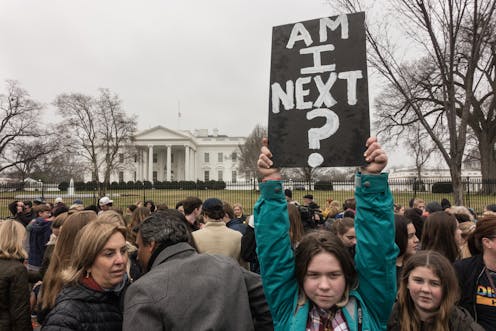School shootings prompted protests, debates about best ways to keep students safe: 5 essential reads
- Written by Jamaal Abdul-Alim, Education Editor, The Conversation

Editor’s note: As we come to the end of the year, Conversation editors take a look back at the stories that – for them – exemplified 2018.
If you look at the time stamp on the article, “Why security measures won’t stop school shootings,”[1] you will see that it was originally published early in the morning on Feb. 14.
Several hours after the story appeared, I found myself working with the author to update it to include the shooting massacre at Marjory Stoneman Douglas High School[2] in Parkland, Florida that took place that afternoon.
The shooting touched off unprecedented[3] nationwide protests by students who called for greater gun control[4] and worried aloud: “Am I next?”[5]
For scholars writing for The Conversation, the school shooting spurred some debate into what it takes to make a school safe. Not all of the scholars saw eye to eye.
1. Kinder and gentler
Bryan Warnick, a professor of the philosophy of education[6] at The Ohio State University, authored the piece[7] we posted on the day of the Parkland shooting. Warnick argued against “target hardening” American schools, saying it might actually make things worse by changing students’ experience in ways that suggest violence rather than prevent it.
“Filling schools with metal detectors, surveillance cameras, police officers and gun-wielding teachers tells students that schools are scary, dangerous and violent places – places where violence is expected to occur,” Warnick wrote.
2. Threat assessments
In contrast to Warnick’s suggested “education approach,” University of Virginia school safety expert Dewey Cornell[8] told Congress that “threat assessments were crucial to prevent school shootings[9].” Such assessments, originally designed to protect public figures like foreign dignitaries and movie stars, could also help protect schools, Cornell argued in a piece adapted from his congressional testimony.
3. More officers?
Will securing the nation’s schools require a school resource officer in every school[10]? F. Chris Curran, a school safety expert[11] at the University of Maryland, Baltimore County, shared research that found that often the training that school resource officers get is very limited.
“For many, the training amounted to little more than shadowing other SROs for a couple weeks,” Curran writes.
4. School culture is crucial
Other scholars say a culture of trust is key for school safety[12].
Calvin Morrill[13], a law and sociology professor at the University of California, Berkeley, and Michael Musheno[14], a University of Oregon law professor, reached that conclusion after a long-term observation of a school they had been visiting since 1995. What they found is that increased security measures – such as metal detectors and security gates – actually led to an increase in student violence. They also found that such security measures eroded the ethos of trust they say is vital to having a safe school.
5. Don’t wait for trouble
Other scholars, such as psychology professor[15] Nathaniel von der Embse of the University of South Florida, warned that schools shouldn’t wait for red flags to address student mental health[16]. Rather, he suggests, schools should use a screening tool to figure out which students are experiencing anxiety or depression that could cause problems later on.
“Research shows that screening tools can help educators identify students with mental health needs with far greater accuracy and speed, rather than waiting for a severe problem behavior, such as a school fight,” von der Embse writes.
References
- ^ “Why security measures won’t stop school shootings,” (theconversation.com)
- ^ shooting massacre at Marjory Stoneman Douglas High School (time.com)
- ^ unprecedented (www.washingtonpost.com)
- ^ greater gun control (time.com)
- ^ “Am I next?” (www.thedailybeast.com)
- ^ professor of the philosophy of education (scholar.google.com)
- ^ the piece (theconversation.com)
- ^ Dewey Cornell (scholar.google.com)
- ^ “threat assessments were crucial to prevent school shootings (theconversation.com)
- ^ a school resource officer in every school (theconversation.com)
- ^ school safety expert (scholar.google.com)
- ^ culture of trust is key for school safety (theconversation.com)
- ^ Calvin Morrill (theconversation.com)
- ^ Michael Musheno (theconversation.com)
- ^ psychology professor (scholar.google.com)
- ^ schools shouldn’t wait for red flags to address student mental health (theconversation.com)
Authors: Jamaal Abdul-Alim, Education Editor, The Conversation

